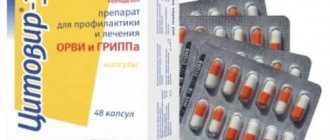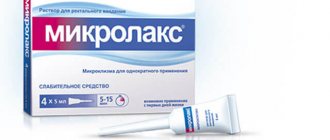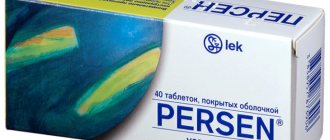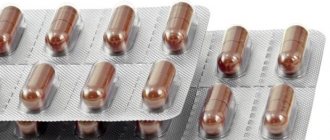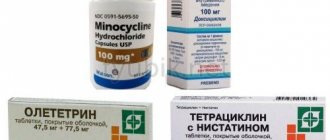Compound
The instructions indicate that Joset syrup includes four active substances. Thanks to them, the medicine produces its therapeutic effects. The active components of the composition contained in 5 ml of syrup are:
- salbutamol sulfate – 1 mg;
- bromhexine hydrochloride – 2 mg;
- guaifenesin – 50 mg;
- menthol – 0.5 mg.
Additional components include:
- purified water;
- sodium benzoate;
- citric acid;
- propylene glycol;
- glycerol
The color and taste of Joset is determined by sodium saccharinate, yellow dye, sucrose, and sorbitol.
pharmachologic effect
The composition of the drug Joset determines its therapeutic effects; it is described in detail in the instructions:
- Salbutamol - helps expand the lumen of the bronchi by stimulating the activity of beta-2 adrenergic receptors. This action quickly relieves bronchial spasm, or even prevents an acute attack.
- Bromhexine - affects mucopolysaccharides of bronchial secretions, destroying their connections, stimulating the activity of secretion cells. This significantly reduces the density of sputum, and coughing becomes more productive.
- Guaifenesin - affects the sputum itself, its adhesive characteristics, therefore the viscosity of the secretion decreases, it is quickly removed from the respiratory system.
- Menthol has a pronounced antispasmodic effect and is an antiseptic. This ingredient quickly soothes, relieves irritation of the mucous membranes, and gently activates the proper functioning of the bronchial glands.
What is Joset
To eliminate or alleviate cough, modern medicine offers a large number of different drugs. Among all cough remedies, Joset occupies a special position, since it is a complex medicine that acts on the original source of the disease and promotes rapid relief from the symptom.
Joset comes in the form of a sweet syrup and is taken orally. In view of this, the product can be used at home - moreover, it is freely available and it is not difficult to purchase it. Meanwhile, the positive effect that the drug has on the respiratory system makes it one of the best for fighting coughs and sore throats.
Joset syrup is a fairly effective expectorant.
When consumed, Joset produces the following effects:
- promotes better sputum separation;
- removes bronchial spasm;
- thins mucus;
- reduces inflammation.
To quickly relieve cough and prevent its harmful effects on the body, Joset is recommended for use by both adults and children. The product is made on the basis of potent components that are quickly absorbed by the walls of the stomach and, together with the blood flow, reach the respiratory tract, providing a therapeutic effect.
Indications for use
According to the instructions, the indications for the use of Joset include the following bronchopulmonary pathologies, which are complemented by difficulty in removing sputum:
- chronic bronchitis;
- bronchial asthma;
- pulmonary emphysema;
- bronchotracheitis;
- COPD;
- inflammatory process of the lungs;
- tuberculosis;
- pneumoconiosis.
According to the instructions, Joset can be used for coughs by children from birth. This is possible thanks to a unique composition that is equally effective and safe for any age group. For the youngest children, the drug is given from a bottle after dilution with water, or from a spoon. The medicine has a sweetish taste, which makes it easier to take.
Joset is used only for dry coughs, as recommended by experts and instructions. If the patient has active spontaneous removal of sputum, then the syrup will worsen the condition. The syrup substances will enhance the activity of the glands of the bronchial epithelium, increasing the volume of secretions. If there is too much secretion, coughing attacks become more frequent, your health becomes much worse, and the disease lasts longer.
What kind of cough does the drug eliminate?
In medicine, there are two types of cough - wet and dry. The latter most often causes the development of complications and more dangerous diseases, such as pneumonia, pharyngitis, asthma and others. Diagnosing a dry (non-productive) cough is quite simple - with it, the patient experiences severe pain in the chest and throat, without coughing up any mucus. The absence of sputum increases inflammation of the airways, which leads to an increase in the intensity of the symptom.
The drug is prescribed for different types of cough
Joset syrup is used to treat both dry and wet cough. In the first case, the drug activates the bronchial glands, which promotes the formation of mucus necessary to remove infection from the body. Also, thanks to the excipients, pain and the intensity of the symptom itself are reduced, and additional antibacterial therapy is provided. Some time after starting to take the drug, the cough enters a productive phase and promotes the movement of mucous masses up the respiratory tract. There they can be easily removed from the body along with the settled infection.
If the patient has a wet cough, the syrup will help further reduce the viscosity of mucus, stabilize its production and serve as an excellent anesthetic and antiseptic.
Contraindications
Contraindications for Joset syrup according to the instructions are as follows:
- myocarditis;
- tachycardia;
- aortic stenosis;
- glaucoma;
- thyrotoxicosis;
- kidney and liver failure;
- stomach and intestinal ulcers;
- history of stomach bleeding;
- pregnancy;
- lactation;
- sensitivity to the composition of Joset.
Carefully, under the strict supervision of a specialist, with strict adherence to the instructions, Joset is prescribed for diabetes mellitus, hypertension, along with antitussives and MAO inhibitors.
Side effects
Side effects from Joset treatment in the instructions are divided into groups according to the affected system in the body.
CNS:
- severe excitability;
- headache;
- dizziness;
- sleep problems;
- trembling and cramps of the limbs.
Gastrointestinal tract:
- nausea, vomiting;
- diarrhea;
- exacerbation of intestinal or stomach ulcers;
- increased activity of liver enzymes.
The cardiovascular system:
- cardiopalmus;
- decline in blood pressure;
- collapse.
The instructions also indicate the following hypersensitivity reactions to Joset:
- rashes;
- hives;
- bronchospasm.
On the part of the urinary organs, only urine is stained with a pinkish tint.
When treating children, adverse reactions of the body most often occur:
- diarrhea;
- nausea;
- vomiting.
Joset syrup instructions for use, method and dosage
According to the instructions for use, Joset syrup is required to be taken orally, diluting the medicine with water or drinking after administration is not required, the taste is normal and does not cause disgust even in small patients.
The total duration of therapy with Joset is 5 – 7 days. If there is no expected effect from treatment, you should inform your doctor, who usually prescribes additional diagnostics and conducts bacteriological examination of sputum.
The dosage according to the instructions depends on the age group of the patient;
- children under 6 years of age, a teaspoon three times a day;
- children 6 – 12 years old 1 – 2 spoons;
- children over 12 years old and adults 2 spoons.
Do not drink syrup with alkaline liquid.
The price for 100 ml of the drug is approximately 200 rubles.
In case of a drug overdose, the same allergic reactions develop, only much more intense. Correction of disorders involves the need to organize symptomatic treatment.
Joset® (Syrup)
Sympathomimetics in combination with other drugs for the treatment of obstructive airway diseases
Code АТХR03CK
Pharmacological properties
Pharmacokinetics
When taken orally, salbutamol is well absorbed from the gastrointestinal tract with a bioavailability of 50-85%. Peak plasma concentrations (Cmax) occur 1-4 hours (Tmax) after oral administration of salbutamol. Food intake does not affect the bioavailability of salbutamol. Plasma protein binding is 10%.
Distribution volume (Vd) 156±38 liters. Salbutamol is metabolized in the liver into its active metabolite, 4-O-sulfate ester. The half-life from blood plasma is 2-7 hours.
Salbutamol is rapidly excreted in the urine (about 64%) in the form of metabolites and unchanged substance; excreted in small quantities with bile and feces.
Bromhexine is quickly absorbed from the gastrointestinal tract. Maximum plasma concentrations (Cmax) are observed 1 hour after oral administration.
Bromhexine undergoes active metabolism during its first passage through the liver to form the active metabolite ambroxol. Widely distributed in body tissues.
About 85-90% is excreted in the urine, mainly in the form of metabolites. The half-life of bromhexine is 6.5 hours.
Guaifenesin is rapidly absorbed from the gastrointestinal tract (25-30 minutes after oral administration). Penetrates into tissues containing mucopolysaccharides.
About 60% of guaifenesin undergoes hydrolysis in the blood within 7 hours to form ß-2-methoxyphenoxylactic acid. Metabolized in the liver. The half-life is 1 hour.
It is excreted with sputum through the lungs and kidneys in the form of inactive metabolites.
After absorption, menthol is excreted in urine and bile as a glucuronide.
Pharmacodynamics
Joset is a combination drug. It has a bronchodilator, expectorant and mucolytic effect.
Thanks to the rational combination of salbutamol, bromhexine hydrochloride, guaifenesin and menthol, the severity of functional disorders of the respiratory system is effectively and quickly reduced as a result of the impact on various parts of the pathogenesis of diseases; The coughing effect of the drug is accelerated and a dry cough becomes effective (wet).
Salbutamol is a bronchodilator, stimulates β2-adrenergic receptors of the bronchi, prevents or relieves bronchospasm.
Bromhexine is a mucolytic agent that has an expectorant and weak antitussive effect. Reduces sputum viscosity due to depolarization of acidic mucopolysaccharides and stimulation of secretory cells of the bronchial mucosa. Activates the cilia of the ciliated epithelium, resulting in improved sputum discharge.
Guaifenesin - reduces the surface tension and adhesive properties of sputum, increases the serous component of bronchial secretions, reduces the viscosity of sputum, activates the ciliary apparatus of the bronchi, facilitates the removal of sputum and promotes the transition of a non-productive cough to a productive one.
Menthol has an antispasmodic effect, gently stimulates the secretion of the bronchial glands, has antiseptic properties, has a calming effect and reduces irritation of the mucous membrane of the respiratory tract.
Indications for use
Acute and chronic bronchopulmonary diseases, accompanied by difficulty in sputum discharge:
- bronchial asthma
- Chronical bronchitis
- emphysema
- chronic obstructive pulmonary disease
- tracheobronchitis
- pneumonia
- pneumoconiosis
- pulmonary tuberculosis
Directions for use and doses
Inside. Taking the drug does not depend on food intake.
Children: aged 3 to 6 years – 5 ml (using a measuring cup or 1 teaspoon) 3 times a day, from 6 to 12 years – 5-10 ml (1-2 teaspoons) 3 times a day daily, adults and children over 12 years old - 10 ml (2 teaspoons) 3 times a day. The course of treatment is determined by the attending physician, no more than 5-10 days
Interaction with other drugs
The likelihood of developing tachycardia when taken together with Joset increases:
- theophylline;
- beta-2 adrenergic agonists;
- xanthines.
The simultaneous use of MAO inhibitors and tricyclic antidepressants can provoke an increase in the activity of the salbutamol component, which is manifested by a sharp decrease in blood pressure.
Glucocorticosteroids and diuretics enhance the hypokalemic effect of the drug.
Simultaneous use with drugs containing codeine or other potent antitussive substances complicates the removal of liquefied and accumulated sputum in a large volume.
Bromhexine promotes better penetration of antibiotics into the lung tissue.
When does it make sense to use it?
Prescribed by a doctor in case of chronic and acute diseases associated directly with difficulties in getting rid of phlegm:
- tuberculosis;
- pneumoconiosis;
- pneumonia;
- tracheobronchitis;
- COPD;
- emphysema;
- chronic bronchitis;
- bronchial asthma.

